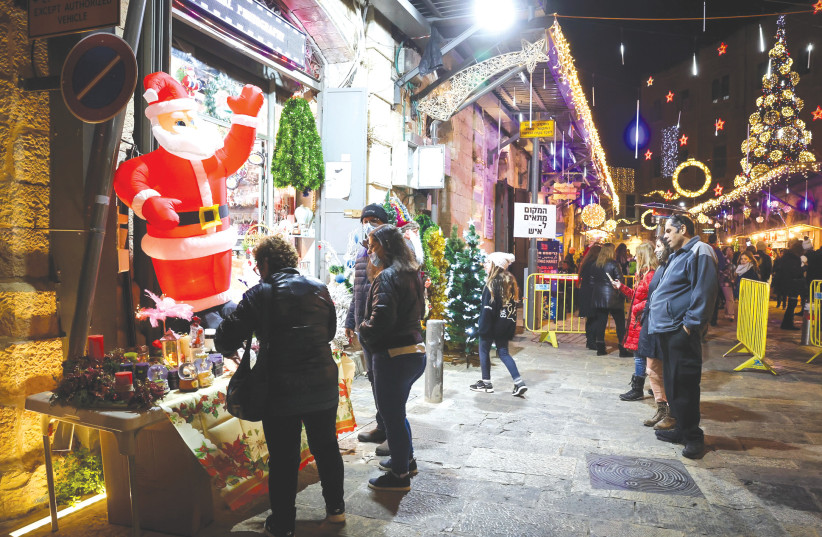’Tis the season, as they say, to wish “Happy holidays” to all those we know, or even pass on the street or stand behind in supermarket checkout lines. Hanukkah, Christmas, New Year's, Sylvester, Novy God, Kwanzaa, Nowruz.
“Happy holidays” is a catch-all greeting. It’s one size fits all and it works for them all.
Jews have assimilated, that’s fact, not opinion. And for many Jews the world over, even – perhaps especially, Jews in the Jewish state, some of these holidays raise serious questions. The cultures of the non-Jewish world have encroached and influenced our Jewish communities, including Israel.
Anyone who has any understanding of Jews in the Diaspora knows that many Jews have Christmas trees in their homes, certainly in their places of business. Many of them couch those trees and call them Hanukkah bushes.
But they’re trees. And no matter when Hanukkah falls, the trees are bought and decorated and enjoyed at Christmas time. When Hanukkah falls out at Thanksgiving time, as it did this year, there were no Hanukkah bushes. Now, there are. Many of these families celebrate both Hanukkah and Christmas. Almost none of them celebrates Purim.

The discomfort of some Christmas-embracing Jews around traditional Jews is often palpable. The guilt on the face of a Jew who had just bought their family tree and, along with his wife, was walking along Broadway and schlepping it home is unlike any emotion I have ever experienced. His “Shabbat Shalom” was whispered and hurried, almost inaudible, but there.
Each year, each generation, more and more Jews are taking on, dare I say embracing, these foreign traditions.
It is impossible to fight assimilation except by isolation.
January 1, the New Year, the “secular” new year, is the perfect example. That’s when it really hits home.
Many places throughout the world don’t call it New Year. They call it Sylvester. That is the term used in Hebrew. The name given to January 1 in Israel. Obviously, it cannot be called Rosh Hashanah. Rosh Hashanah is the first and second day of Tishrei.
Once you know the history behind Sylvester, you will probably never call it that again. You may even opt out of celebrating or commemorating the day entirely.
Sylvester was a pope. He served from 313 to 345 CE. And according to legend, Pope Sylvester was responsible for converting Emperor Constantine to Christianity. In other words, because of Pope Sylvester, the Roman Empire turned Christian. Until then, the Roman Empire was polytheistic. The Romans worshiped multiple deities. The ripple effect of that conversion has been gargantuan and has reverberated throughout the next 1700 years. All because of Pope Sylvester.
He was, of course, sainted.
The anniversary of Sylvester’s death is December 31. It was turned into a holiday replete with feasting and celebration.
Pope Sylvester was a notorious Jew-hater.
Jews from the former Soviet states celebrate neither New Year nor Sylvester. They celebrate “Novy God” – New Year in Russian. Novy God was the only non-Communist holiday on the Communist calendar. The Russian president would speak, the Kremlin clock would strike midnight and the celebration would commence. It was a celebration of winter.
The idea of Jews celebrating winter in Israel, just like Jews celebrating Christmas anywhere, is a bit out of sync. In 2004 a bill was proposed before the Knesset to outlaw these non-Jewish traditions. The bill failed.
This influence of outside culture is not unique to Jews. Judaism and Israel are not alone when it comes to the quandary wrought by the influence of outside culture in insular societies and religions.
Iranians, world over, celebrate a Persian new year. It is called Nowruz and it is an official holiday in Iran. It is the most important festival of the year in Iran. If you thought Sylvester is a Jewish stretch – Nowruz is even more of a stretch for Iranians. Nowruz, which means “new day” in Persian, is a carryover from Zoroastrian tradition. Before Islam, the main tradition of the area was Zoroastrianism.
The first followers of Zarathushtra were from the area of Persia and they have been worshiping since about 1200 BCE, which is the late Bronze, early Iron age. Nowruz has certainly stuck around. And even though Muslim leadership in Iran has turned Zoroastrians into a persecuted minority and the belief in Zoroastrian tradition is considered heresy, Nowruz is still honored.
But it doesn’t start January 1. It starts in March, on the vernal equinox.
Jewish life and Israeli life have been influenced by the dominant culture in which Jews lived. Russian culture influenced Russian Jews. American culture influenced American Jews. Those cultures were brought to Israel.
As much as our communities may sometimes feel like a ghetto or a shtetl – they are not. For better and for worse, non-Jewish culture encroaches upon us. The responsible and mature response is to teach our children that, while these traditions are nice, they are not ours. That not embracing those traditions is another way we have to show the world that we are unique and different and proud to be Jewish.
The writer is a columnist and a social and political commentator. Watch his new TV show, Thinking Out Loud, on JBS. He maintains The Micah Report.
